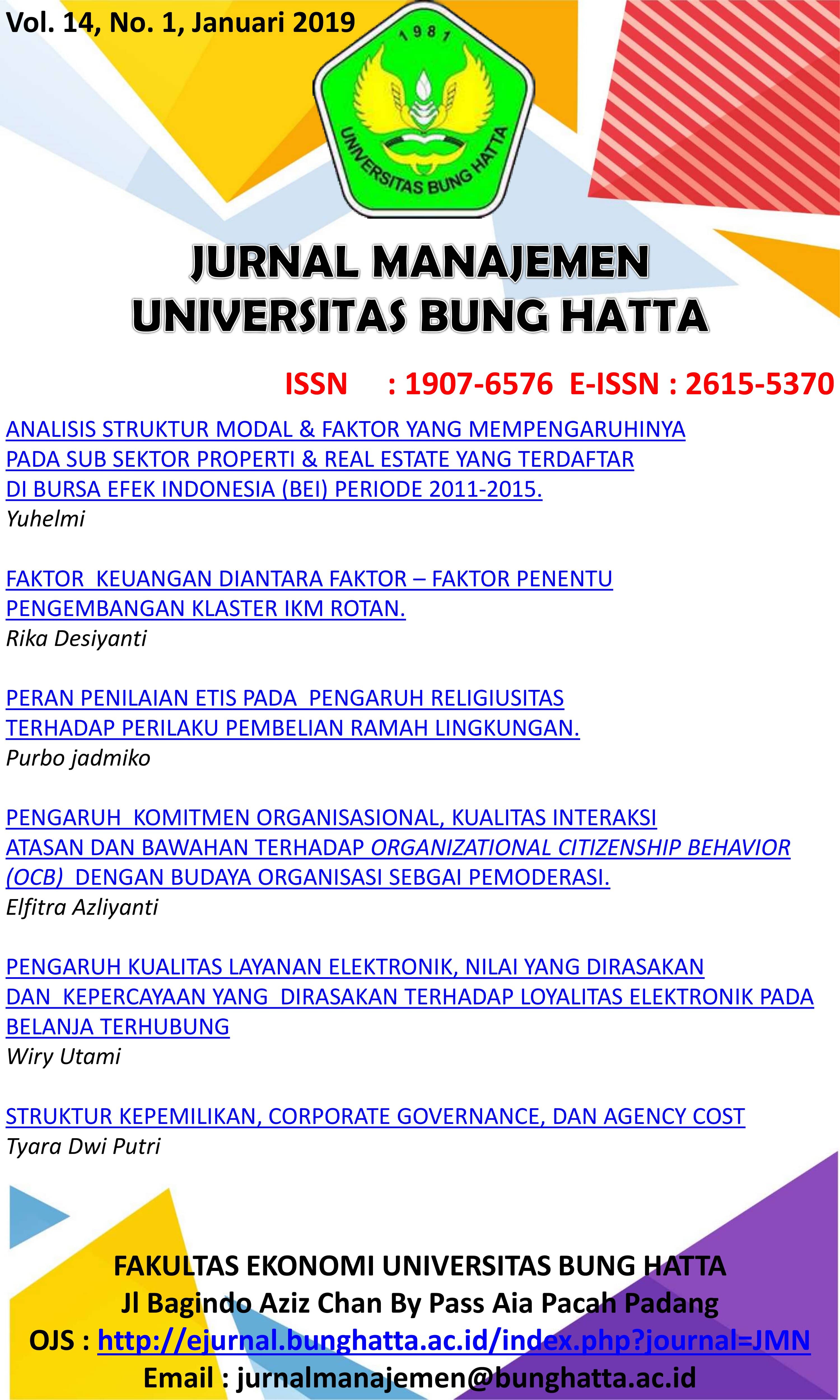PERAN PENILAIAN ETIS PADA PENGARUH RELIGIUSITAS TERHADAP PERILAKU PEMBELIAN RAMAH LINGKUNGAN
DOI:
https://doi.org/10.37301/jmubh.v13i2.12486Abstract
Applying the conceptual framework of value-attitude-behavior relationship, the present study investigates the role of ethical judgment as mediating effect religiosity to green purchase behavior. Using linier regression analysis, the role of ethical judgment, religiosity on green purchase behavior are investigated. The subject of the research is costumer in Padang. Results suggest that religiosity positive significant to green purchase behavior. But, ethical judgment has partial mediated between religiosity on green purchase behavior. Implications and directions for future research are discussed.
References
Ali, A., Sherwani, M., & Ali, A. (2015). Green Purchase Behavior and pro-environment behavior in a pakistani sample within an individual religiosity framework. Global Journal of Advanced Research, 2 (5), 865 – 876.
Bamberg, S. (2003). How does Green Purchase Behavior influence specific environmentally related behaviors? A new answer to an old question. Journal of Environmental Psychology, 23, 21–32.
Baron, R. M., & Kenny, D. A. (1986). The moderator-mediator variable distinction in social psychological research: Conceptual, strategic, and statistical considerations. Journal of Personality and Social Psychology, 51, 1173-1182.
Hair, J. F. Jr., Black, W. C., Babin, B. J., & Anderson, R. E. (2010).Multivariate data analysis. 7th ed. Upper Saddle River, NJ: Prentice Hall.
Han, H., Jane Hsu, L., Lee, J., &Sheu, C. (2011). Are lodging customers ready to go green? An examination of attitudes, demographics, and eco-friendly intentions. International Journal of Hospitality Management, 345–355.
Hunt, S. D.,&Vittel, S. M. (1986). A General Theory of Marketing Ethics.Journal of Macromarketing, 6, 5–15.
Kaynak, Ramazan & Eksi, Sevgi. (2011). Ethnocentrism, Religiosity, Environmental and Health Consciousness: Motivators for Anti-Consumers . Eurasian Journal of Business and Economics, 4 (8), 31-50.
Kim, Y., &Choi, S.M. (2005).Antecedents of Green Purchase Behavior: An Examination of Collectivism, Sikappeduliterhadaplingkungan and PCE. Advances in Consumer Research, 32, 592-599.
Laroche, M., J. Bergeron, G., & Barbaro-Forleo. (2001). Targeting consumers who are willing to pay more for environmentally friendly products. Journal of Consumer Marketing, 503–520.
Mokhlis, S. (2003). Relevancy and Measurement of Religiosity in Consumer Behavior Research. International Business Research, 2 (3), 75-84.
Ozer, G., Ozbek, V., Elci, M.,&Aydin, K. (2013). Concurrent Validity of Different Religiosity Scales Used in Researches of Marketing Ethics and A Proposal For A New Religiosity Scale. Anadolu University Journal of Social Sciences, 503–520.
Reidenbach, R. E., &Robin, D. P. (1990).Toward the Development of a Multidimensional Scale for Improving Evaluations of Business Ethics.Journal Business Ethics, 8:639–653.
Singhapakdi, A., Vitell, S. J., Lee, D., Nisius, A. M., & Yu, G. B. (2013). The Influence of Love of Money and Religiosity on Ethical Decision-Making in Marketing. Journal Business Ethics, 114:183–191.
Vitell, S. J., Paolillo, C. G. P., & Singh, J. J. (2005). Religiosity and Consumer Ethics.Journal of Business Ethics, 57 (2), 175-181.
Wahid, N. A., Rahbar, E., & Shyan, T. S. (2011). Factors influecing the Green Purchase Behavior of Penang environmental volunteers. International Business Management, 5 (1), 38-47.
Downloads
Published
Issue
Section
License
Copyright (c) 2020 Purbo Jadmiko

This work is licensed under a Creative Commons Attribution-ShareAlike 4.0 International License.
Authors who publish with Jurnal Manajemen Universitas Bung Hatta agree to the following terms:
- Authors retain copyright and grant the journal right of first publication with the work simultaneously licensed under a Creative Creative Commons Attribution-ShareAlike 4.0 International License that allows others to share the work with an acknowledgement of the work's authorship and initial publication in Jurnal Manajemen Universitas Bung Hatta.
- The author holds the copyright of the submitted and published articles, with the understanding that articles are disseminated under the Creative Commons Attribution-ShareAlike 4.0 International License..
- The editor team is entitled to do the editing in accordance with the guidelines for writing or template in the Jurnal Manajemen Universitas Bung Hatta.
This work is licensed under a Creative Commons Attribution-ShareAlike 4.0 International License.












